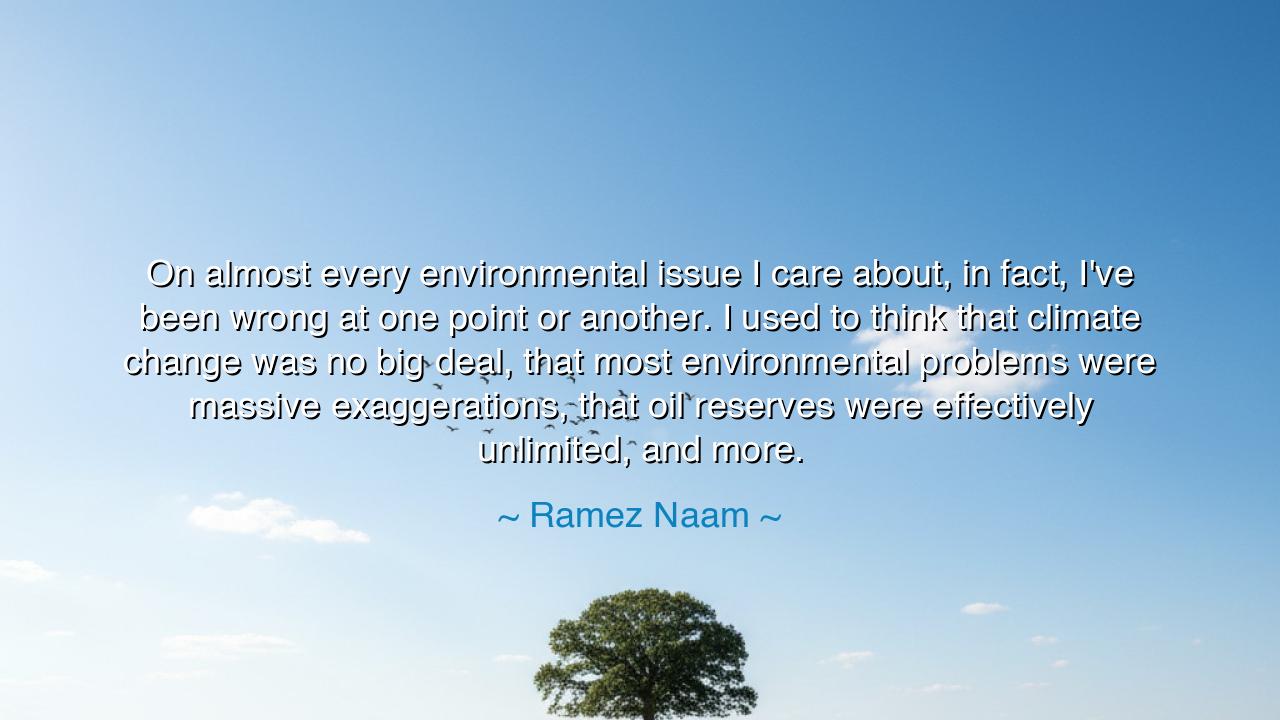
On almost every environmental issue I care about, in fact, I've
On almost every environmental issue I care about, in fact, I've been wrong at one point or another. I used to think that climate change was no big deal, that most environmental problems were massive exaggerations, that oil reserves were effectively unlimited, and more.






In the words of Ramez Naam, we find the confession of a seeker who has journeyed through the darkness of misunderstanding into the light of awareness: “On almost every environmental issue I care about, in fact, I've been wrong at one point or another. I used to think that climate change was no big deal, that most environmental problems were massive exaggerations, that oil reserves were effectively unlimited, and more.” This is not merely an admission of error — it is an act of humility, a rare and noble acknowledgment that wisdom is born not from being right, but from learning when one is wrong. Naam’s reflection reveals the sacred truth the ancients always taught: that knowledge without self-reflection is blindness disguised as sight.
To say “I have been wrong” is not weakness; it is the first breath of wisdom. The ego resists this, for pride clings to certainty as a drowning man clings to driftwood. Yet only when we release that false security can we swim freely in the sea of truth. Ramez Naam, a thinker shaped by science and reason, mirrors the journey of all who grow — those who begin in denial, are humbled by reality, and emerge renewed in understanding. So too, countless scholars, inventors, and prophets before him have discovered that error is the soil in which enlightenment takes root.
Consider the tale of Galileo Galilei, who dared to look beyond inherited belief and saw the heavens anew. His generation believed the Earth stood still, a motionless center of all things. When Galileo’s telescope revealed otherwise, the world resisted — for truth often comes first as blasphemy. Yet Galileo’s courage to admit that ancient certainty was false changed the course of human thought forever. His story teaches that even civilizations must sometimes say, “We were wrong,” if they wish to evolve. In this, Naam stands among a lineage of thinkers who understand that correction, not comfort, is the path to progress.
When Naam confesses that he once dismissed climate change and environmental danger as exaggerations, he speaks for many. For generations, humanity has chosen convenience over consequence, profit over preservation. We have treated the Earth as if her gifts were infinite — only to awaken, as he did, to the limits of our delusion. The oil that once symbolized prosperity now burns as a warning flame upon the horizon. The forests that once seemed endless now vanish in smoke. The seas that once teemed with life now rise in silent rebellion. His awakening is humanity’s own, as if the planet herself whispered, “You were wrong — and there is still time to learn.”
To acknowledge error is to open the door to transformation. Those who cling to their mistakes become brittle and break beneath the weight of truth, but those who embrace humility become adaptable, resilient, and wise. Naam’s journey from skepticism to stewardship is not shameful — it is heroic. It reminds us that evolution is not only a law of biology, but of the soul. The wise are not those who never stumble, but those who rise each time with clearer eyes and a deeper sense of duty.
Yet this awakening must not remain personal; it must become collective. The ancients taught that to see truth and not act upon it is to commit a sin against the self. So too must we act upon what we now know: to change our habits, our industries, our hearts. The call of environmental responsibility is not a political cry but a moral one — the recognition that our dominion over nature has always been stewardship, not ownership. The moment we see our error, we must begin to heal what we have harmed.
Let this be the enduring lesson: Do not fear being wrong. Fear only the arrogance that keeps you from learning. For every great awakening begins with humility. If Ramez Naam, a man of science, could admit his blindness and grow wiser through it, so too can we. The Earth does not demand perfection from us — only honesty, courage, and change. Therefore, let each of us walk the path of correction with open eyes and steadfast hearts, for in the humility of acknowledging our mistakes lies the power to redeem both ourselves and the world we share.






AAdministratorAdministrator
Welcome, honored guests. Please leave a comment, we will respond soon